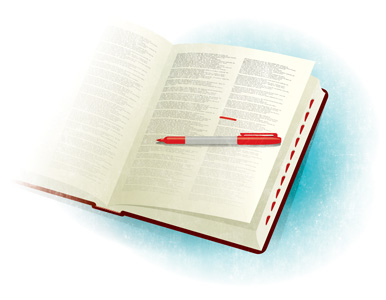
What word would you strike from the dictionary?
Words breed expectations in our minds. If we hear a problem is unsolvable, we’re hesitant to try. Thankfully, many forge ahead regardless, as when Andrew Wiles proved Fermat’s elusive Last Theorem and AI wizards generated realistic natural language with the likes of ChatGPT and GPT-4.
Naomi Baron is professor emerita of linguistics and author of Who Wrote This? How AI and the Lure of Efficiency Threaten Human Writing.
As someone with a career rooted in words, I would hate to let any of them go. But, if I had to get rid of one, I’d choose “to be” and all its variations. English provides so many descriptive verbs that allow us to paint a dynamic picture of our lives and our world, it seems a shame to use such a static word. Why simply be when we can do so many things?
Paul Albergo is an adjunct professor in the School of Communication and faculty advisor of the AU student magazine, AWOL.
From a DEI perspective, we are asked to go beyond tolerance to achieve equity and inclusion. But tolerance implies an unequal relationship—one in which the tolerator has the power to choose whether or not to tolerate. Tolerance is not enough. It’s not a step in the right direction, and if not properly defined, it is limiting and demeaning. Valuing and appreciating are a better place to begin.
Quintenilla Merriweather is associate director for student equity, access, and retention at AU’s Center for Diversity and Inclusion.
Monolingualism. I’d like to see the world be even more multilingual than it already is. As a linguist, though, rather than talking about striking words out, I think that dictionaries should be more inclusive to keep pace with language and culture in real time.
Amelia Tseng is a professor of Spanish and linguistics and director of the College of Arts and Sciences’ new linguistics minor.
We have power and choice in every situation; it’s up to us to decide if we want to use them.
Doubt makes people fearful and keeps us stuck in the status quo. When we gather the courage to trust, we are better equipped to disrupt inequity and more likely to put forward our best solutions to promote equity. May doubt no longer stifle the power of our choices.
Annice Fisher is the inaugural antiracist pedagogy scholar in the School of Education.
Sacrilege! As a linguist, I react to striking words from the dictionary like an environmentalist invited to dine on pandas and bald eagles. Instead, how about we reinstate a few of my favorites from Middle English, like oxter, losel, and yex [armpit, scoundrel, hiccup]?
Robin Barr is linguist in residence in the College of Arts and Sciences.